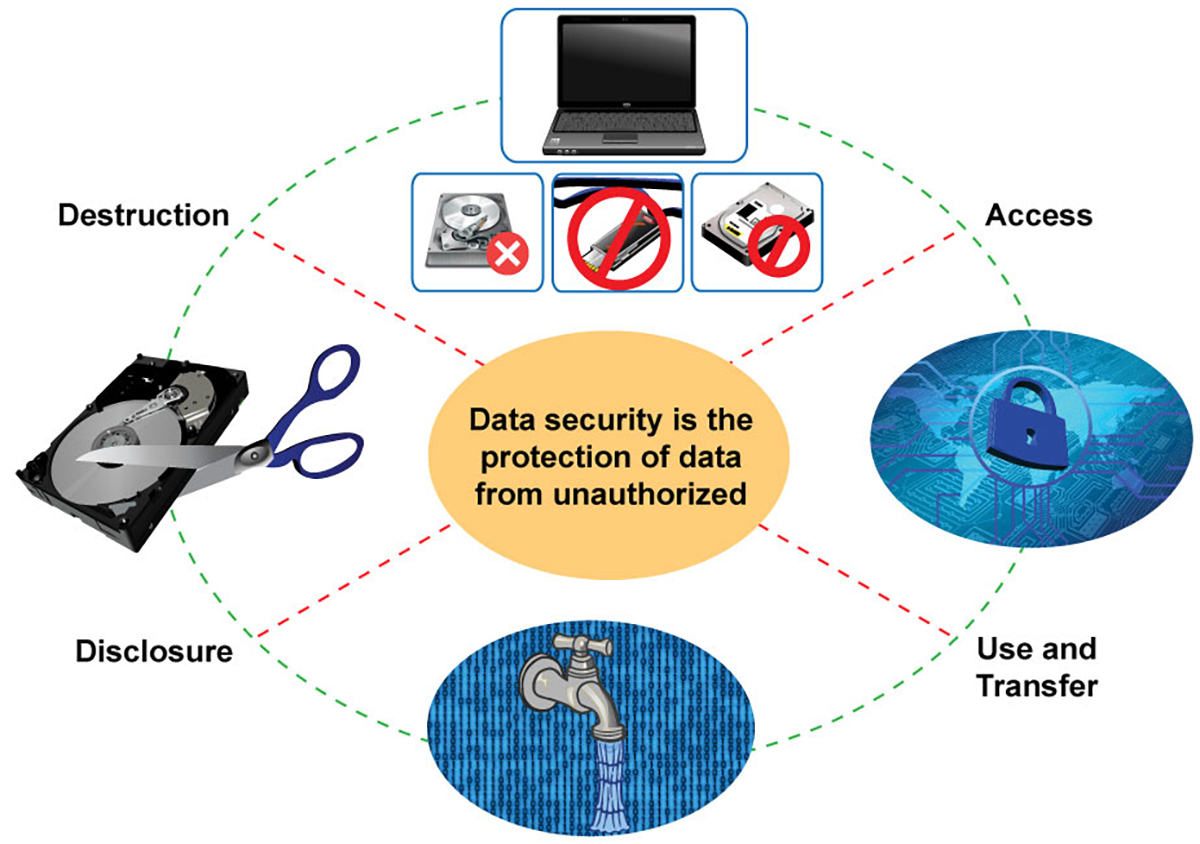Top Tips for Ensuring Secure Data Destruction in Your Cyber Security Plan
Top Tips for Ensuring Secure Data Destruction in Your Cyber Security Plan
Blog Article
The Vital Nature of Information Destruction in Upholding Computer Security Providers and Protecting Against Unauthorized Gain Access To
In an age where information violations and identity burglary are significantly common, the value of reliable information devastation can not be overstated. Organizations needs to identify that the failing to effectively dispose of delicate info postures not only lawful and financial dangers yet also a prospective erosion of client trust. Different methods, from data cleaning to physical devastation, function as crucial safeguards versus unapproved gain access to. Nonetheless, comprehending the ramifications of information devastation practices and conformity with guidelines raises crucial concerns regarding the adequacy of current techniques and their long-lasting viability in the face of developing risks.
Value of Information Damage
In an increasingly digital globe, the importance of information destruction can not be overemphasized. As companies amass vast amounts of sensitive information, the potential repercussions of failing to appropriately get rid of and handle of that information become significantly serious. Data breaches, identification burglary, and business reconnaissance pose substantial risks, underscoring the need of efficient information devastation practices.

Moreover, as innovation progresses, so too do the approaches by which malicious actors seek to manipulate delicate info. Organizations needs to stay attentive and aggressive in their information devastation methods to protect versus these advancing dangers. By prioritizing information devastation, companies not just shield their properties but additionally foster depend on amongst stakeholders and customers, demonstrating a dedication to liable data monitoring and safety practices.
Approaches of Effective Data Destruction
To make sure the complete and irreparable devastation of delicate data, organizations can use a variety of efficient approaches customized to their specific needs. Among the most common approaches is data wiping, which involves using specialized software program to overwrite existing data numerous times, making recuperation basically difficult. This is specifically helpful for hard disks and solid-state drives, where conventional removal methods are insufficient.
One more efficient technique is degaussing, which makes use of solid electromagnetic fields to interrupt the magnetic domains on storage media, providing the data irretrievable. This method is particularly suited for magnetic storage space devices, such as tape drives and hard disks.
Physical destruction is likewise a sensible alternative, involving the shredding, crushing, or incineration of storage gadgets. This method assurances that data can not be recouped, making it optimal for organizations taking care of highly delicate information.

Compliance With Information Security Laws
Organizations have to not just focus on effective data devastation methods however likewise ensure compliance with data security regulations that govern how delicate details is taken care of and thrown away. Complying with these guidelines is important for maintaining and safeguarding individual data customer count on. Laws such as the General Information Security Law (GDPR) in the European Union and the Medical Insurance Mobility and Liability Act (HIPAA) in the United States enforce rigorous guidelines on information management, that include needs for the safe and secure disposal of delicate details.
To accomplish compliance, organizations must apply thorough data destruction plans that align with these legal structures. This consists of determining information that needs devastation, establishing procedures for protected methodsâEUR" such as shredding physical media or using software that meets sector requirements for data wipingâEUR" and preserving thorough records of damage tasks. Routine audits should this content be carried out to guarantee adherence to these policies and to recognize any possible locations for enhancement.
Failing to comply with information defense laws can cause considerable lawful implications, consisting of hefty fines and damage to a company's credibility. For that reason, incorporating conformity into data damage techniques is not just a lawful responsibility but additionally a vital element of a robust info safety and security approach.
Repercussions of Poor Information Handling
Poor data handling can cause extreme effects that prolong past immediate operational problems. Organizations might deal with considerable financial losses as a result of data breaches, which typically lead to expensive remediation initiatives, lawful costs, and regulatory penalties. These economic ramifications can prevent and strain sources development, ultimately impacting an organization's profits.
Additionally, bad information handling can severely damage an organization's online reputation. Stakeholders, consumers, and partners might shed depend on in an entity that stops working to safeguard delicate info, leading to reduced client commitment and prospective loss of business chances. This erosion of count on can take years to reconstruct, if it can be recovered whatsoever.
Furthermore, organizations might encounter lawful ramifications emerging from non-compliance with information defense guidelines. Such infractions might result in fines and examinations, worsening the monetary burden and additional tainting the company's image.
In the realm of cybersecurity, poor data monitoring techniques can develop vulnerabilities that make systems a lot more susceptible to unapproved gain access to and cyberattacks. Eventually, these repercussions highlight the important value of executing durable information handling treatments official source to guard sensitive details and keep organizational stability.
Best Practices for Secure Information Disposal


Firstly, data must be identified according to its level of sensitivity. Sensitive information calls for a lot more extensive disposal approaches, such as shredding physical records and utilizing innovative software program for electronic data cleaning. Utilizing qualified data damage services guarantees conformity with market guidelines and standards.
Secondly, companies ought to execute a data disposal policy that mandates routine audits. This policy should describe the treatments for data retention and destruction, ensuring that obsolete data is gotten rid of immediately and firmly. Educating workers on these protocols is important to promoting a society of safety and security recognition.
Lastly, preserving in-depth documents of disposed information improves liability and gives a clear audit path. This documentation needs to include the kind of information ruined, the technique made use of, and the day of disposal.
Verdict
Finally, the vital of efficient data damage is apparent in its role in improving computer safety and security services and minimizing unauthorized accessibility dangers. Adopting durable methods such as data cleaning, degaussing, and physical damage, along with conformity with guidelines like GDPR and HIPAA, is essential for safeguarding sensitive information. Ignoring proper data disposal methods can cause serious effects, including data breaches and lawful repercussions. Carrying out best methods in secure data disposal inevitably strengthens organizational honesty and customer count on.
In an era where data breaches and identity theft are increasingly widespread, the relevance of effective data damage can not be overemphasized. data destruction. Data breaches, identity burglary, and business espionage present significant threats, underscoring the requirement of effective information damage methods
Conformity with regulations such as GDPR and HIPAA mandates that organizations implement stringent information security measures, including the secure devastation of data at the end of its lifecycle.
By Related Site prioritizing data damage, business not just protect their possessions however likewise foster depend on amongst stakeholders and clients, showing a commitment to responsible information monitoring and protection methods.
Organizations have to not just focus on reliable data destruction approaches yet additionally ensure compliance with data security laws that govern just how sensitive info is taken care of and disposed of.
Report this page